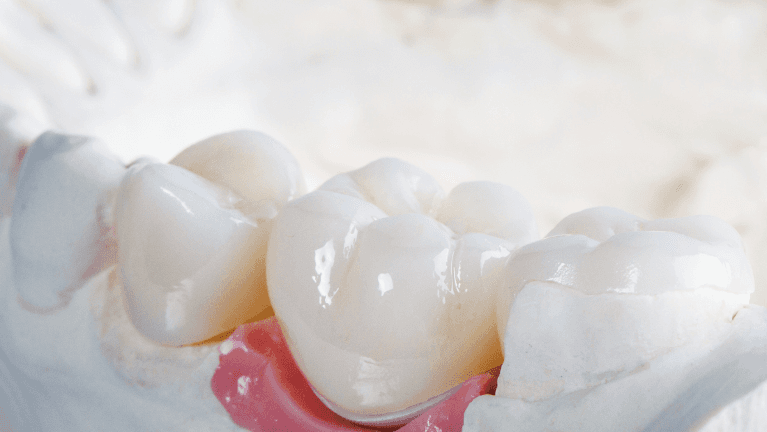
Since their invention, dental crowns have rapidly become one of the most widely used restorative dental procedures. Before crowns, if a tooth were severely damaged, it would simply be removed, often leaving a noticeable gap in the teeth. While effective, this method could lead to a variety of other issues, including weakening the jawbone.
This blog discusses dental crowns and examines five common signs that indicate you might need a dental crown. If you experience any of these symptoms, visit your dentist as soon as possible to discuss your suitability for the procedure.
What Are Dental Crowns?
Teeth consist of roots and crowns. The root is below the gum line, and the crown is the visible part of the tooth that is the most vulnerable to damage. A dental crown is an artificial replacement for the visible part of the tooth. Dental crowns are custom-made to blend seamlessly with your natural teeth in color, shape, and size.
Dental crowns can be made of porcelain, metal, resin, ceramic, or a combination of materials which provide the durability of metal and the appearance of porcelain or ceramic. Once your crown has been hand-crafted to match your natural teeth, it will be fixed to your damaged tooth with dental cement. Here are five of the most common signs that you might need a dental crown:
1. You Have Damage Caused by Bruxism
If you grind your teeth in your sleep or because of stress, you may experience intense jaw pain, tooth pain, and tooth damage like fractures and chips. If you have had treatment to address the Bruxism, dental crowns can repair the damage caused.
It’s vital to remember that if you continue grinding your teeth, you may damage the crowns. Therefore, it’s essential to seek help for your Bruxism before considering dental crowns. Dental crowns can protect teeth damaged by grinding and restore their function so you can bite and chew without pain.
2. You Had Root Canal Treatment
If you’ve had a root canal to treat deep decay, your dentist removed all the dental tissue from the inside of your tooth. While this does remove the decay and can save the tooth, it does weaken the structure of the tooth, making it more prone to fractures.
Treated teeth need protection, and dental crowns are the most commonly used way to prevent damage. A filling is adequate for some front teeth, but a dental crown restores function and strength for back teeth that are responsible for chewing.
3. Your Teeth Are Misshapen or Stained
Over time, teeth often develop small chips or gradually become misshapen due to grinding. As you age, your teeth may also become stained due to smoking, coffee, alcohol, sugary foods and drinks, and poor dental hygiene. These issues can have a significant impact on your confidence, and in severe cases, staining cannot be reversed with cleaning.
In situations where the shape or color of your teeth has progressed beyond repair, dental crowns offer a solution. A dental crown covers the damaged tooth and restores its shape to return to full functionality for biting and chewing. The custom-made crown will also be precisely color-matched to mimic the natural color of your unstained teeth.
4. You Have Cracked, Chipped, or Broken Teeth
If you regularly experience significant tooth pain, especially when biting or chewing, you may have a broken or fractured tooth. Teeth weakened by damage from fillings, dental trauma, or decay can chip or crack easily and biting down on a weak tooth can cause severe breakage.
Dental crowns support, protect, and strengthen broken teeth by holding them together to prevent further damage. The severity of the break will determine whether a filling or dental crown is required. Your dentist may recommend a crown as a more long-term solution.
5. You Have Extensive Decay
If a cavity has progressed deep into the tooth, there may not be sufficient healthy structure left to support a filling. In these cases, dentists typically recommend a dental crown, as it provides better protection than fillings.
Many people put off going to the dentist when their cavities are still minor. This delay leads to the decay becoming progressively worse until the patient is in so much pain that they can no longer ignore it.
Dental Crown Maintenance
While crowns are highly durable and can last for many years, they do require consistent care, so it’s crucial to maintain diligent dental hygiene. If your teeth have become damaged due to a lack of proper hygiene, it is absolutely vital to develop good habits now, which include:
- Brushing your teeth twice a day
- Using mouthwash after brushing
- Flossing after every meal
When flossing, it’s essential to work slowly and carefully to remove food particles without affecting your dental crowns. Between the teeth that have crowns, you must slowly slide the floss down and gently pull it back and forth. Next, it is vital to remove the floss carefully by releasing one end and pulling it out from the side to avoid snagging the crown and tugging it out of position.
Expert Guidance and Dental Care
If you believe you might need a dental crown, contact Dr. Nargiz Zadeh to schedule a consultation. With the limitless possibilities of modern dentistry, you no longer need to exist with constant discomfort or embarrassment because of damaged teeth. Let our practice help you regain the smile you deserve.